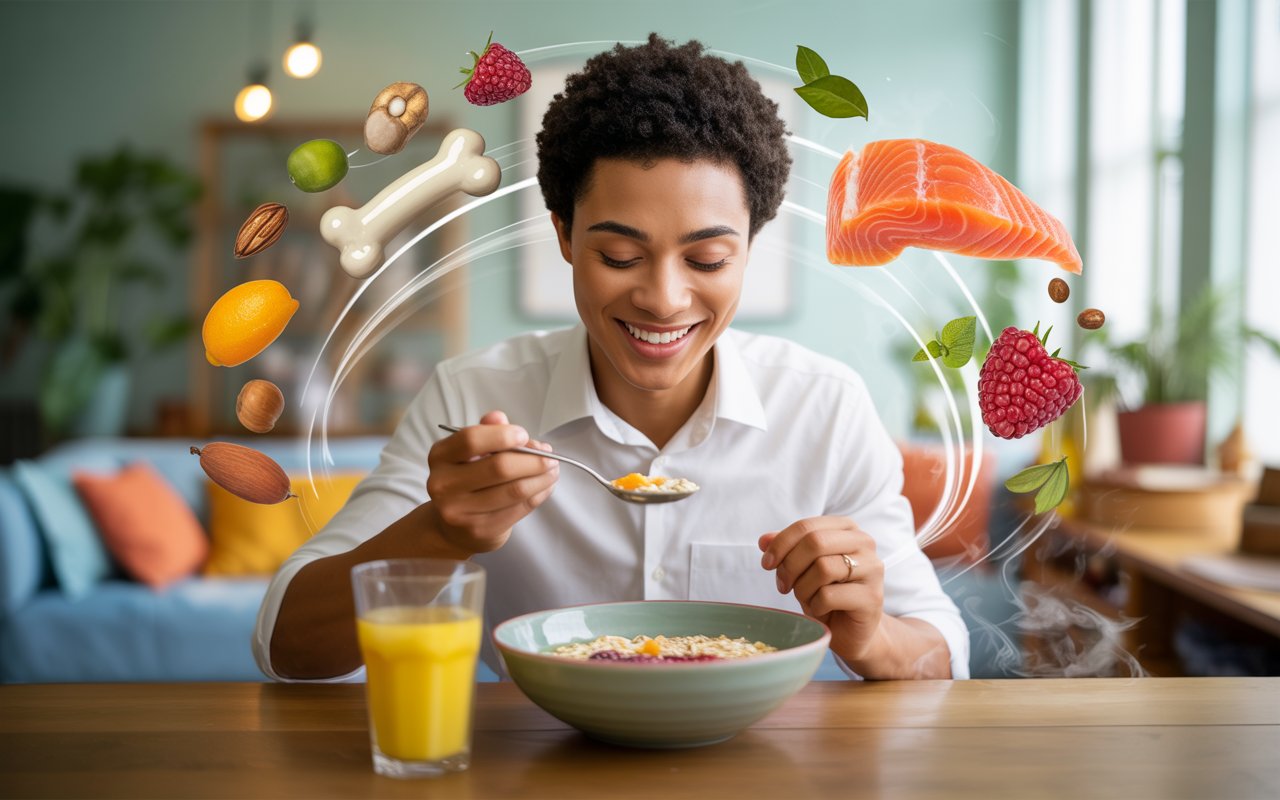Daily Diet: Simple, Healthy, and Balanced Every Day

Let’s be honest — most of us have felt that weird energy crash that hits right when we need to focus the most. For me, it used to happen right after lunch. I’d have this big plate of fried rice or a burger, feel amazing for about 10 minutes, then struggle to keep my eyes open in front of my laptop. It wasn’t until I looked at my daily diet that I realized what I ate was sabotaging my energy more than my workload ever did.
The truth is, a balanced daily diet isn’t about strict rules or swearing off your favorite treats. It’s about feeding your body the right fuel so you can get through your day feeling good, not drained, bloated, or craving more junk an hour later. So grab a cup of tea, get comfy, and let’s unpack exactly how to build a daily diet that works for you, your routine, and your goals.
Why Should You Even Care About a Balanced Daily Diet?
Think of your body like your dream car. You wouldn’t pour random oil or fuel into it and expect it to run smoothly, right? Same idea here. A balanced daily diet gives you everything your body needs to repair cells, keep your immune system strong, boost your brain power, and help you wake up with real energy, not just the caffeine buzz.
Here’s a deeper breakdown:
1. Proteins: Your Builders
Protein is not just for bodybuilders. It’s the building block for your muscles, organs, skin, and even your hair. If you skip on protein, you might notice your hair thinning, feeling tired more often, or struggling to recover after a workout. Foods like eggs, fish, lean meat, tofu, paneer, beans, and Greek yogurt are all great ways to slot protein into your daily diet.
2. Carbs: The Right Kind Fuels Your Brain
I’ve seen so many people say, “Carbs make you fat, avoid them.” Not true at all. Carbs are your brain’s main energy source. The trick is picking slow-digesting carbs like oats, quinoa, sweet potatoes, and whole grain bread, not refined sugars or white bread that spike your sugar and crash you right after.
3. Fats: Healthy Ones are Golden
Healthy fats keep your hormones balanced and your skin supple. They also help you feel satisfied. I used to avoid fat altogether, but adding nuts, seeds, olive oil, avocados, or fatty fish like salmon completely changed my skin and mood for the better.
Healthy fats keep your hormones balanced and your skin supple. They also help you feel satisfied. I used to avoid fat altogether, but adding nuts, seeds, olive oil, avocados, or fatty fish like salmon completely changed my skin and mood for the better.
4. Vitamins & Minerals: The Tiny but Mighty Players
These little nutrients help your body run thousands of invisible processes — from carrying oxygen to your cells to fighting infections. Fresh fruits, vegetables, nuts, and seeds cover most of what you need if you mix up your meals daily.
5. Fiber & Water: Your Gut’s Best Friends
If you ever feel bloated or struggle with digestion, your fiber and water intake probably needs a check. Whole grains, fruits, veggies, and pulses give you fiber, while plain water helps push everything smoothly through your system.
Your Daily Diet Blueprint: One Size Doesn’t Fit All
We all have different bodies, ages, routines, and goals, so your daily diet should respect that. Let’s break it down phase-by-phase.
For Teenagers (13–19 years)
This is when the body’s growing like crazy — bones, muscles, hormones, the works. Teens need extra calories and protein to keep up. So big breakfasts (like oatmeal with nuts or eggs and toast), hearty lunches (rice, dal, veggies, maybe chicken or paneer), and healthy snacks (fruit, yogurt, nuts) are perfect.
For Adults (20–50 years)
This is peak hustle time — jobs, families, maybe working out too. Men usually burn more calories due to muscle mass, so they need more protein and carbs to keep energy steady. Women often need to focus a bit more on iron (think spinach, beans, lean meats) and healthy fats for hormonal balance.
For Elderly (60+)
As we age, metabolism slows, and digestion can become sensitive. Soft, easy-to-digest foods work best — think soups, khichdi, well-cooked veggies, and yogurt for gut health. A little walking or light yoga helps keep bones strong, too.
For Kids (4–12 years)
Kids are constantly burning energy — running, playing, growing. Their daily diet should have milk or alternatives, eggs, fruit, nuts if there are no allergies, and home-cooked meals rich in veggies and grains.
Real-Life Daily Diet Routine: A Day on My Plate
To make this super clear, here’s an honest look at what my day usually looks like now that I’ve cracked my daily diet puzzle.


7–9 AM: Morning Fuel
Oatmeal or Poha: If I want something warm, I go for poha with peas and peanuts or oatmeal with chopped apple.
Protein Kick: 2 boiled eggs or a paneer bhurji if I have time.
Hydration: 1 big glass of water with a squeeze of lemon. I swear this tiny habit helps digestion.
12–2 PM: Midday Power
Main Bowl: Brown rice or chapati with dal, a veggie stir fry, and sometimes grilled fish or chicken.
Side: A bowl of salad or plain yogurt.
4 PM: Snack O’Clock
Smart Snack: A Handful of roasted chana or nuts, and green tea.
Sweet Tooth Fix: A small piece of dark chocolate or fruit.
6–8 PM: Dinner Done Right
Light & Comforting: Lentil soup with sautéed mixed veggies and maybe a chapati or small portion of millet.
Alternate: If I’m hungrier, I have grilled paneer or a veggie pulao.
Before Bed
Hydration: Warm turmeric milk or just herbal tea if my stomach feels heavy.
Tweak It: Daily Diet for Special Goals
A huge plus of building your daily diet is that you can adjust it for what you’re aiming for. Here’s how I do it for different goals:
Daily Diet for Weight Loss
Calorie Deficit: Eat slightly fewer calories than you burn, but never starve.
Protein Focus: Keeps you full and helps preserve muscle.
Ditch Empty Calories: Bye soda, packaged snacks, and sugar-heavy coffee drinks.
Hydrate Like Crazy: Drink water before meals — it curbs overeating.
Daily Diet for Muscle Gain
Eat Protein Often: Eggs, chicken, paneer, tofu — every meal.
Add Good Fats: A spoonful of peanut butter or some almonds for snacks.
Post-Workout: A quick whey shake if you lift weights — helps muscle recovery big time.
Daily Diet for Glowing Skin
Antioxidants: Berries, citrus fruits, kiwi — nature’s glow-givers.
Omega-3s: Fatty fish, flaxseeds, and walnuts for hydration from the inside.
Hydration: Always have a bottle nearby. I infuse mine with cucumber and mint.
Daily Diet to Boost Immunity
Natural Boosters: Turmeric milk before bed, garlic, and ginger in your cooking.
Vitamin C: Oranges, amla, and lemons all help fight infections.
Probiotics: Yogurt or fermented foods like homemade pickles or kanji.
Diverse Choices: Veg, Vegan, Indian, and More!
One of my biggest struggles used to be finding ideas that matched my mood or culture. Here’s how to keep it fun and balanced:


Indian Veg Daily Diet Plan
Breakfast: Poha or upma with veggies.
Lunch: Roti, dal, sabzi, and a bowl of curd.
Dinner: Khichdi or veg pulao with a side of salad.
Vegan Daily Meal Plan
Breakfast: Smoothie bowl with seeds and nut butter.
Lunch: Chickpea salad or a tofu stir-fry.
Dinner: Coconut milk-based curry with brown rice.
Mediterranean Inspiration
Lots of olives, hummus, grilled fish, veggies drizzled with olive oil, and whole grain pita.
Keto Version
Eggs, cheese, avocados, paneer, low-carb veggies. Very low on carbs, high on fats.
Build Good Habits: Make Your Daily Diet Sustainable
Fancy plans fail if your daily habits don’t match. Here’s what works for me and my friends:
Mindful Eating: Don’t scroll your phone. Taste your food.
Portion Control: Use smaller bowls if you tend to over-serve.
Meal Prep: Batch cook grains and curries. Saves you from ordering pizza at midnight.
Smart Swaps: Swap soda for lemon water, chips for nuts, and white rice for brown.
Consistency is King: One cheat meal won’t ruin you, but regular good habits make all the difference.
Frequently Asked Questions — Answered Honestly
When should I eat breakfast?
Between 7–9 AM. A solid breakfast keeps you from random snacking.
Do I need supplements?
If your daily diet is diverse and colorful, probably not. But check with your doctor if you feel low on energy.
How much water is enough?
I aim for 2–3 liters, but your needs vary with weather and activity.
Can I do this on a budget?
Yes! Local veggies, lentils, and grains are way cheaper than daily takeout.
Should I skip dinner to lose weight?
Nope. Eat a light dinner early instead — it helps digestion and sleep.
| Food | Vitamins & Minerals | Calories (per 100g) | Deep Benefits |
|---|---|---|---|
| Spinach | Vitamin K, A, Folate, Iron, Magnesium | 23 kcal | Promotes blood clotting, boosts hemoglobin, supports eye health, fights inflammation. |
| Carrots | Vitamin A, K1, Biotin, Potassium | 41 kcal | Improves vision, supports skin, strengthens immunity, balances blood sugar. |
| Salmon | Vitamin D, B12, Omega-3, Selenium | 206 kcal | Boosts brain health, supports heart, strengthens bones, anti-inflammatory protein. |
| Eggs | Vitamin D, B12, Selenium, Choline | 143 kcal | Muscle building, brain support, balances good cholesterol, nutrient-dense. |
| Greek Yogurt | Calcium, B2, B12, Iodine, Phosphorus | 59 kcal | Supports gut health, strengthens bones, provides probiotics, muscle recovery. |
| Almonds | Vitamin E, Magnesium, Copper, Fiber | 579 kcal | Powerful antioxidants, heart-friendly fats, steady energy release, supports skin. |
| Sweet Potato | Vitamin A, C, Potassium, Manganese | 86 kcal | Slow-release carbs, boosts immunity, great for digestive health. |
| Oats | Iron, Magnesium, B1, Zinc | 389 kcal | Lowers cholesterol, stable energy, plant protein, supports gut microbiome. |
| Chickpeas | Folate, Iron, Manganese, Phosphorus | 164 kcal | Rich plant protein, great fiber, stabilizes blood sugar, iron-rich vegetarian food. |
| Broccoli | Vitamin C, K, Folate, Sulforaphane | 34 kcal | Detoxification, bone health, immune support, cancer-fighting antioxidants. |
